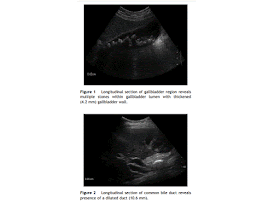Abstract
Purpose: Laparoscopic cholecystectomy (LC) has become the
treatment of choice for cholelithiasis. Still some patients required conversion
to open cholecystectomy (OC). Our aim was to develop a standardized Ultrasound
based scoring system for preoperative prediction of difficult LC.
Methods and
materials: Ultrasound findings of 300 patients who underwent LC were reviewed
retrospectively. Four parameters (time taken, biliary leakage, duct or arterial
injury, and conversion) were analyzed to classify LC as easy or difficult. The
following ultrasound findings were analyzed: GB wall thickness, pericholecystic
collection, distended GB, impacted stones, multiple stones, CBD diameter and
liver size. Out of seven parameters, four were statistically significant in our
study. A score of 2 was assigned for the presence of each significant finding
and a score of 1 was assigned for the remaining parameters to a total score of
11. A cut-off value of 5 was taken to predict easy and difficult LC.
Results: 66 out of 83
cases of difficult LC and 199 out of 217 cases of easy LC were correctly
predicted on the basis of scoring system. A score of >5 had sensitivity
80.7% and specificity 91.7% for correctly identifying difficult LC. Prediction
came true in 78.8% difficult and 92.6% easy cases. US findings of GB wall
thickness, distended GB, impacted stones and dilated CBD were found
statistically significant.
Conclusion: This indigenous scoring system is effective in
predicting conversion risk of LC to OC. Patients having high risk may be
informed and scheduled appropriately and decision to convert to OC in case of
anticipated difficulty may be taken earlier.



Không có nhận xét nào:
Đăng nhận xét